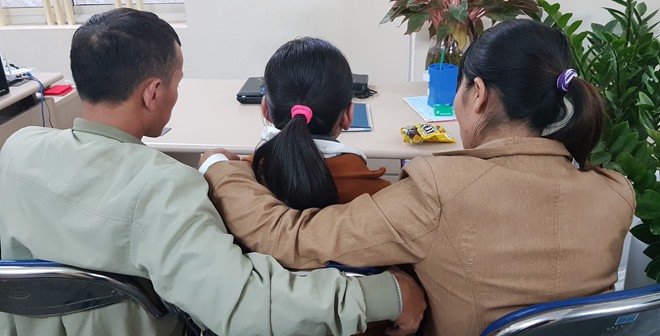 Society
Society

Viet Nam still lacks mechanisms to prevent the abuse of children in various forms and support children victims, participants said at the second meeting of the National Committee for Children in Hà Nội on Friday.
 |
| The nine-year-old victim is comforted by her parents. — Photo thanhnien.vn |
HÀ NỘI — Viet Nam still lacks mechanisms to prevent the abuse of children in various forms and support children victims, participants said at the second meeting of the National Committee for Children in Hà Nội on Friday.
Attendees said the abuse of children is still dealt with on a case-by-case basis, and efforts to revise legal documents to correct out-of-date regulations and close loopholes have not received due attention.
The Việt Nam Association for Protection of Children’s Rights Chairwoman Nguyễn Thị Thanh Hoà noted that families need to make children aware of their rights. They must also prevent and handle violence and sexual abuse of children.
Hòa recommended providing books on children’s rights and measures to protect children to school libraries and tightening supervision at a grassroots level. She also urged building child-friendly procedures to encourage families and children to report incidents to authorities.
Deputy Prime Minister and Chairman of the National Committee for Children Vũ Đức Đam assigned MoLISA and the medical and education sectors to work with youth and women’s organisations to build local child protection networks as instructed by the National Committee for Children.
Child sexual harassment cases needed special legislation, experts said following the case of a nine-year-old girl who was sexually assaulted in Hà Nội’s outlying district of Chương Mỹ recently.
Chương Mỹ District police arrested a man in connection with the case and initially charged him with molesting a minor. He was released under supervision pending prosecution, but was re-arrested on Tuesday by Hà Nội Police who are charging him with rape.
The case has highlighted conflicting interpretations of the law by different agencies.
“This leads to disparity in the investigation, prosecution and judgement processes. A detailed decree or joint circular needs to be released to work on similar cases,” said Vũ Thị Xuân Nhuệ, head of District 3’s People’s Procuracy in HCM City.
According to Việt Nam’s current Criminal Code, any person convicted of raping a person under 16 faces 7-15 years in jail. A person who molests someone under 16 for purposes other than sexual intercourse or other sexual activities faces a penalty of 6-36 months behind bars.
Đặng Hoa Nam, director of the Childcare and Protection Department under the Ministry of Labour, Invalids and Social Affairs (MoLISA), told Thanh Niên (Young people) newspaper that Việt Nam’s criminal code lacked specific regulations on child sexual assault, especially rape.
The Justice Council of Việt Nam’s Supreme People’s Court has called for a resolution to be released to instruct local courts how to handle child sexual harassment cases.
It was difficult for law enforcement agencies to collect evidence and victims’ testimonies in child abuse cases, Lieutenant Colonel Khổng Ngọc Oanh, head of the Child Abuse Prevention Department under the Ministry of Public Security (MPS), said.
“In most child abuse cases, the incidents occur in isolated areas so there are no witnesses. Law enforcement agencies have to search for evidence from other sources such as victims’ testimonies or the crime scene,” he explained.
Lawyer Trần Thị Ngọc Nữ from HCM City’s Children Protection Association urged victims’ parents to report abuse.
She added that female police and social workers tended to be more effective in these cases.
“Physical examinations in child sex abuse cases should both serve the investigation and ensure the victims’ mental wellbeing,” said Nam.
Besides the Law on Children and the Criminal Procedure Code, which have some regulations regarding such cases, other legal documents fail to provide the adequate procedures to deal with child abuse cases.
“The legal system needs to provide a separate process for cases related to children and minors,” he added.
According to the MPS’s Lieutenant-General Trần Văn Vệ, a joint circular released on February 5, 2019 by the MPS, MoLISA, the Supreme People’s Court and the Supreme People’s Procuracy contained special requirements related to cases involving victims under 18 years old.
According to the circular, inspectors, prosecutors and judges must first be trained in psychology and education to work with minors.
The participation of representatives, schools and other related organisations was also required to protect the rights of victims. — VNS




